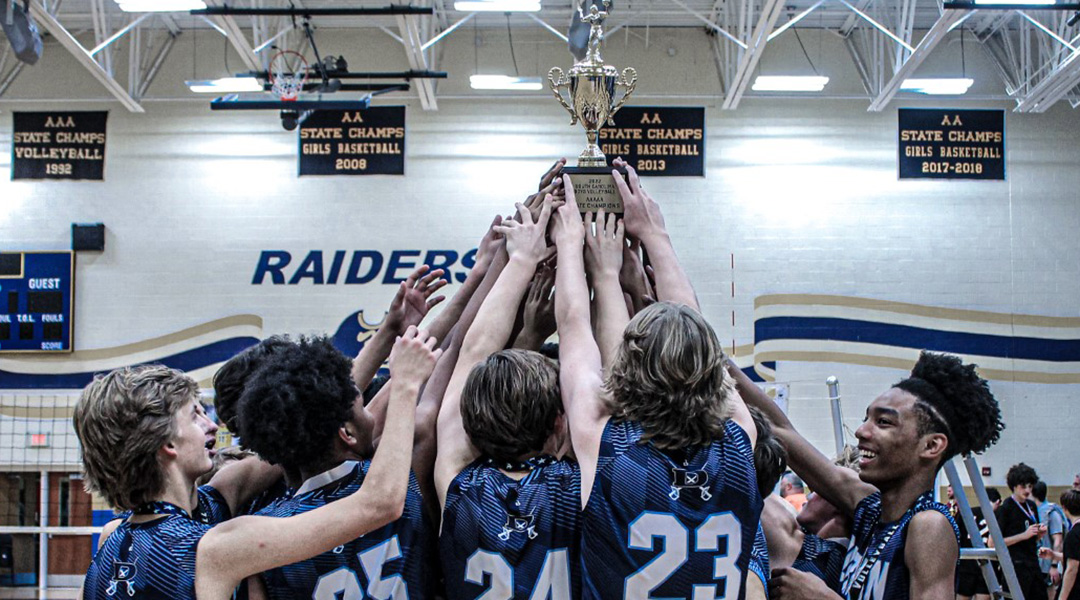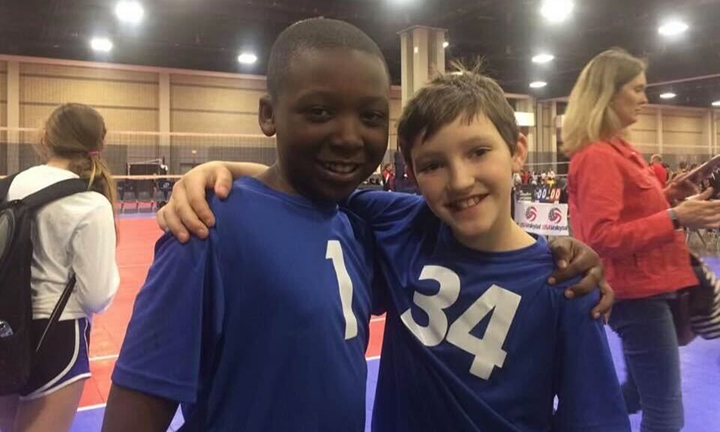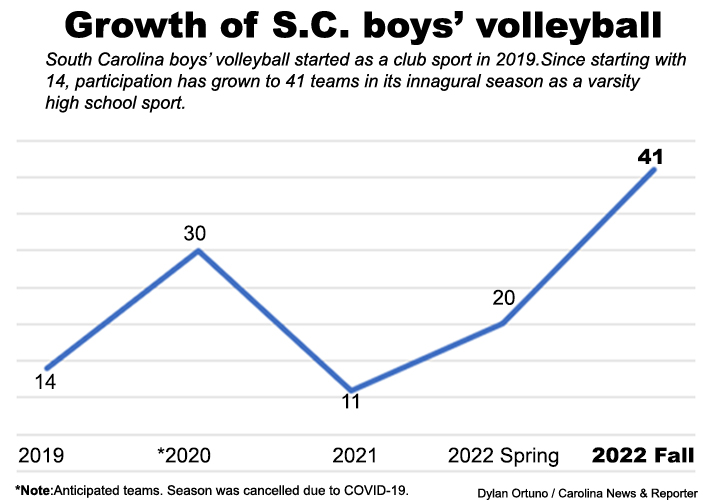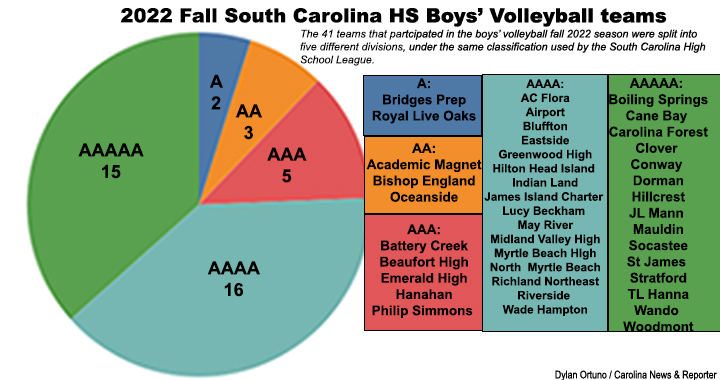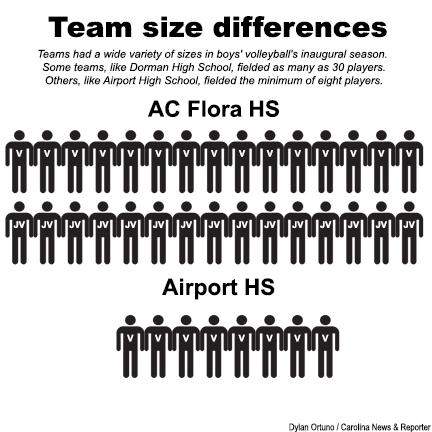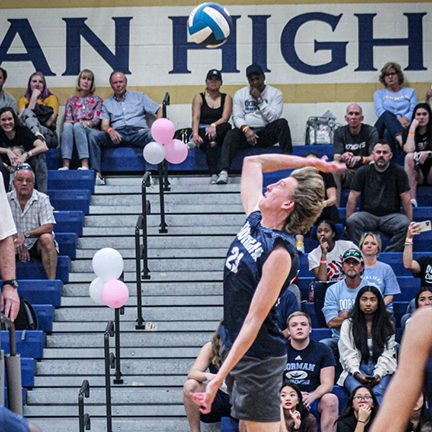Dorman High School boys volleyball team holding up the 2022 AAAAA State Championship trophy (Photo courtesy of Stjphotography)
Kelly Owens wanted to help her 9-year-old son play volleyball. She found a travel team for 12-year-old girls. He joined. A few years later, in the fifth-grade, his team won the league championship.
But he would not play on that team, or in that league, again. The league wouldn’t let him.
“That made a problem,” said Owens. “All of a sudden, it was the one team with a boy that won the championship. The parents and coaches were upset about it. So when the next year rolled around, and I went to the coaches meeting. … They said ‘absolutely no boys on the girls teams.'”
So Owens and her husband began advocating for a boys league.
“Out of all of that came a middle school league we have here in Charleston,” Owens said. “It was only for boys and was very small at first.”
He couldn’t play in high school either. That’s because high school volleyball in South Carolina was a girls sports. Boys volleyball didn’t have its first-ever varsity season, first in 41 high schools, until the Fall of 2022. The Carolina News and Reporter spoke with 27 coaches, players and administrators to get an inside look at how boys volleyball made it into South Carolina high schools.
But Owens and her son helped change everything.
What did Owens do?
She learned of a job opening for an outreach director position for the startup league that later morphed into a varsity sport.
“They had gotten a grant for boys’ volleyball and were looking for a boys volleyball outreach person,” Owens said. “I had already been doing that, so I just sent my resume in with all my volleyball experience.”
Now, Owens’ son is playing on Hanahan High School’s team.
2022 — THE FIRST SEASON
At first, many boys didn’t know what they were doing.
“When I first came in after tryouts, we did some drills,” Greenwood High School Head Coach Michael Murray said.
Or at least, he tried to. He quickly realized advanced drills were useless — the boys couldn’t even do the basics.
“Once I realized we couldn’t run drills until the boys could pass, we would pass all day long until they learned how to,” he said.
His team’s experience wasn’t unique. Many coaches around the state were teaching boys how to play competitive ball for the first time. The S.C. High School League sanctioned boys’ volleyball as a varsity sport starting in Fall 2022. It is the first time a varsity sport has been added to S.C. high schools since lacrosse was added in 2009.
“The (high school) league constitution says that if 16 schools offer a sport, we can make it sanctioned,” league Commissioner Jerome Singleton said.
Because there were already 20 club teams playing across the state, Singleton felt it was time to go varsity. But “varsity” means the league becomes much more regulated.
RECRUITING
With these regulations have come growing pains.
Head Coach Craig Bachman already was coaching a club team at Hanahan High. He thought recruiting for a varsity team would be easy. And it was — at first.
He had 26 players when it was a spring season club sport.
“Seven (players) graduated, so we can’t really replace their losses,” he said. “But … nine who we were expecting … opted for football.”
Competing with football and other more established sports, coupled with the unfamiliarity of brand new sport, made recruiting players difficult.
In the Midlands, Airport Head Coach Shane Beaver said he only had eight players all year, the minimum required to field a team.
“And here we were visiting other schools where they’d have 10 seniors alone,” he said.
Some schools, such as AC Flora and Dorman high schools, had so many players that they created junior varsity squads.
“We had a great turnout and a lot of interest,” Flora Head Coach Lewis Overbay said. “We had 30 guys who wanted to play, so we put 15 on our varsity and 15 on our JV team.”
SCHEDULING
The schools involved now had to figure out how to play other teams.
“The biggest hurdle … was the timing of the season,” said Owens, who still holds her outreach job but now is also an assistant principle at Hanahan Middle School.
Owens said that league decided the sport would run alongside the girls volleyball schedule in the fall because the spring sport season was “too busy.” But that caused problems with court and officiating availability.
“We had multiple games get cancelled because of the (officiating availability),” said James Island Charter School Head Coach Jason Yeates.
“We used to run in the spring after basketball was done,” Owens said. “The positive of that was the gym was available since nobody would play then, and the girls (volleyball) coaches and players would volunteer to officiate.”
When the sport got its varsity status, volunteer officials were no longer allowed.
At Boiling Springs High School, Head Coach Rachel Hyatt said her team sometimes played with only one referee as opposed to the standard two.
Owens, too, experienced the shortage of officials. She attended a match in which no referee showed up. She walked out of the stands, consulted both coaches — explaining her background in the sport — and unofficially refereed the game.
That match was her “ah ha” moment.
“With the parents and everyone cheering the teams on, that was everything we had worked for,” she said.
Scheduling never did get codified in the sport’s first season. Teams played whichever team agreed to play against them. And mid-season tournaments popped up — in Myrtle Beach, Charleston and the Upstate. All teams were welcome.
PLAYOFFS
But post-season play was a different story.
The first season had no post-season play, but had unofficial playoffs sponsored by an outside organization.
The plan is to incorporate an official playoff in 2023, Owen said.
But now the question became: How do we create the brackets? Because the league did not account for post season play, there was no official recording-keeping body. Teams had to figure out how to verify and validate their records.
“I had coaches sign up to platforms like MaxPreps, whereby they could submit their scores,” Owens said of the sports database and website where teams can keep track of scores, rosters, player stats and schedules.
“During the season, we then kept up a massive spreadsheet where we would keep all those scores as they uploaded them,” Owens said.
Owens said schools were divided into divisions and the teams’ records determined their seeding. Finally, teams played in finals for each of three divisions at Keenan High School in Columbia on Oct. 15.
The first-ever state champions were Bishop England High School, Lucy Beckham High School in Mount Pleasant and Dorman.
“(Winning the championship) was a crazy feeling,” Dorman senior Jackson Chance said. “Our opponent was Carolina Forest, who were undefeated, like us. I said to my teammates, ‘Whoever loses, it’s their first loss,’ and I’m glad it wasn’t us. It was so surreal. I was speechless. It didn’t feel real at all that we won.”
Dorman Head Coach Drew Copeland was ecstatic.
“I can’t say it enough, but I’m so proud of this team and this senior class with the leadership they’ve provided,” he said. “They are starting something new and creating a legacy. I can’t wait to see how (boys’ volleyball) continues to grow and unfold.”
Parker Owens, right, son of Kelly Owens, posing with a teammate after a middle school boys volleyball match. Parker previously played on an all-girls travel team. (Photo courtesy of Kelly Owens)
Dorman High’s No. 23 Tyler Kuehl hits a ball during the the 5A final between Dorman and Carolina Forest High School in Myrtle Beach. (Photo courtesy of Stjphotography)

